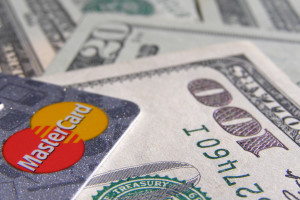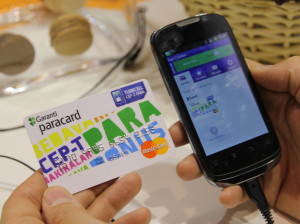Category: Mail Order Telephone Order
December 16th, 2013 by Elma Jane
1. Account Updater (Visa)
Incorrect billing information leads to declined credit cards, loss of sales and unhappy customers.
Visa touts its Account Updater as an easier way to keep customer data current. The tool appends all card data with up-to-date customer info so businesses can avoid difficulties over address changes, name changes, expired cards and more.
The tool can benefit any business that bills customers on a recurring basis.
It eliminates the need for manual administration, so it can lower your business’s operational costs and customer-service expenses. And by saving your clients the hassle of a declined payment, you can boost customer satisfaction and overall sales.
2. Netswipe
Paying online is convenient for customers, but keying in an unwieldy credit card number is still a pain.
Netswipe from Jumio gives customers an easier way: The tool lets users pay by snapping a photo of their credit card; it’s almost as easy as swiping your card through a traditional card reader.
According to Jumio, customers can use their smartphone or tablet to scan a card in as little as 5 seconds, whereas traditional key entry takes 60 seconds or more, on average. Having a quick and convenient way to pay could help contribute to a positive buying experience and encourage repeat business.
The system is compatible with any iOS or Android mobile device, as well as with any computer with a webcam.
3. Netverify
Jumio’s fraud-scrubbing tool helps you determine if your customers are who they say they are.
Net verify allows customers to snap a picture of their driver’s license or other identification using a smartphone, tablet or PC webcam. Once the image is taken, the tool can verify the authenticity of the documentation in as little as 60 seconds.
That’s much faster and more convenient than asking a customer to fax or mail a copy of their ID in the middle of a transaction.
The tool can verify identifying documents from more than 60 countries…including passports, ID cards and driver’s licenses, and even bank statements and utility bills. Jumio says its software is smart enough to automatically reject nonauthentic documents.
And customers can rest easy knowing that all submitted information is protected with 256-bit encryption to prevent identity theft.
Online merchants embed Netverify into their websites as part of the checkout process.
4. Payment Gateway
Payment Gateway service does all the heavy lifting of routing and managing credit card transactions online.
Portals like this one benefit small businesses by providing a fast and secure transmission of credit card data between your website and the major payment networks. It works a lot like a traditional credit card reader, but uses the Internet to process transactions instead of a phone line.
Payment Gateway also offers built-in fraud-prevention tools and supports a range of payment options, including all major credit cards and debit cards.
5. PayPal Here
Mobile credit card processing services like PayPal Here make it easy to accept credit cards in person using a smartphone or tablet.
PayPal Here and other similar services send you a dongle that attaches directly to your iPhone, iPad or Android device, allowing you to swipe physical credit cards wherever you are.
One major benefit of mobile credit card readers is that they work with the devices you already own. That means there’s no need to carry around additional hardware, aside from the reader add-on itself. Most credit card readers attach to your device via the headphone jack or charger port, and are small enough to fit in your pocket.
The smallest businesses have the most to gain by opting for mobile credit card readers, which are cheaper and far more portable than traditional options.
6. Virtual Terminal
If you do business online, your website needs the infrastructure to accept credit card information.
Web-based applications like virtual terminal offer the basic processing functionality of a physical point-of-sale system, and are easy to install on your business’s website.
The system allows merchants to collect orders straight from the Web, or take orders via phone or mail and before initiating card authorizations online.
It also includes extensive transaction history to help you manage payment data, split shipments, back orders and reversals. Business owners can even receive a daily email report of all credit card transaction activity from the prior day.
Posted in Best Practices for Merchants, Credit card Processing, Credit Card Reader Terminal, Credit Card Security, e-commerce & m-commerce, Electronic Payments, EMV EuroPay MasterCard Visa, Gift & Loyalty Card Processing, Mail Order Telephone Order, Merchant Cash Advance, Merchant Services Account, Mobile Payments, Mobile Point of Sale, Near Field Communication, Point of Sale, Smartphone, Visa MasterCard American Express Tagged with: account, Android, authenticity, card data, card reader, checkout, checkout process, credit card number, credit card transactions, debit cards, declined payment, expired, fraud, id, iOS, mail, mobile device, nonauthentic, online, online merchants, passports, payment data, payment gateway, payment options, phone, point of sale, recurring, smartphone, tablet, verify, visa, webcam
December 2nd, 2013 by Elma Jane
Post Office launches new payments service to help small businesses make more money.
The Post Office in partnership with WorldPay, has launched a new card payment service to help sole traders and small businesses. The Post office which services around four million small businesses, will offer them a range of ways to take secure card payments made in-store, online, via mail or telephone order, or on the move, which it hopes will plug a 20 per cent revenue gap between firms that accept card payments and those that don’t. According to new WorldPay research, 87 per cent of customers are likely to spend more money per transaction when paying with a debit or credit card, as opposed to cash.
The study also showed during the past year, one in five of UK consumers has had to abandon a purchase due to a small business or sole trader not accepting cards or because they weren’t carrying enough cash to pay. The service includes card machines for in-store payments or those made via mail or telephone order, and online payment pages for websites.
There is also a Pay As You Go option for sole traders and mobile businesses, like hairdressers or beauty therapists, who can sign up to take secure Chip and PIN card payments.
Posted in Credit card Processing, Electronic Payments, Mail Order Telephone Order Tagged with: card payments, Chip and PIN, credit-card, in-store, mail or telephone order, online, payment, purchase, secure, service, transaction, worldpay
October 31st, 2013 by Elma Jane
While credit card processors and retailers have made strides to combat credit card fraud, it is still rampant across the U.S. In fact, credit card fraud jumped 17 percent between January, 2011, and September, 2012, according to the most recent data from the FICO Falcon Fraud Manager Consortium.
Debit cards obviously have better safeguard measures in place, since debit card fraud rose less than 1 percent between January, 2011, and September, 2012. Plus, the average fraud loss per compromised account fell by 3 percent.
Card-not-present (CNP) fraud is the biggest challenge by far, accounting for 47 percent of all credit card fraud. CNP fraud – which includes payments via the internet, mail and phone – grew 25 percent over the two-year period. So, where the problems with credit cards lie.
Unfortunately, CNP fraud may get worse before it gets better, in FICO’s Banking Analytics Blog. This problem may even intensify as the US moves away from magnetic stripe and toward EMV [chip] card technology. In other countries adopting chip-based authentication technology, we’ve seen counterfeit fraud decline, but as a counterbalance, fraudsters often ramp up efforts around CNP fraud.
However, there was a glimmer of light in the credit card fraud fiasco. While card fraud attempts rose, the average loss per compromised account dropped 10 percent. Plus, the ratio of fraud to non-fraud spending remained constant. “In other words, the volume of card fraud increased proportionally to the volume of consumer credit card spending.
Even though many retailers have implemented successful fraud prevention programs, Visa provides retailers with the warning signs for CNP fraud, including:
Multiple cards used from a single IP address. Orders made up of “big ticket” items. Orders that include several of the same item. Shipping to an international address. Transactions with similar account numbers.
Posted in Digital Wallet Privacy, EMV EuroPay MasterCard Visa, Mail Order Telephone Order, Payment Card Industry PCI Security Tagged with: account, analytics, authentication, banking, big ticket, card-not-present, chip card, chip-based, cnp, counterfeit, credit-card, debit cards, EMV, fraud, fraudsters, international, internet, magnetic stripe, mail, non-fraud, orders, payments, phone, prevent, processors, retailers, safeguard, spending, transactions, visa
October 29th, 2013 by Elma Jane
Three dimensions merchants must look for in a payment system PSP and ISO:
1. Ability to adapt and customize the solution.
2. Solutions that support broad range of payment methods.
3. Supports a full set of different channels and devices.
Difference between a PSP and ISO in the payments ecosystem? Online and Mobile Payments:
There are two types of merchant service providers and not all service providers are made equal, Processors and Resellers:
Resellers are known in the industry as Independent Sales Organizations (ISO’s) and/or Merchant Service Providers (MSP’s).
1) Resellers or ISOs – ISOs resell the products or services of one or multiple processors. They can also develop their own or aggregate other value added products and services. ISO’s range from a little sketchy to best in class providers.
2) Processors – Also known as Acquirers, processors are distinguished by their ability to actually process a transaction. To be a processor, a company must have the technical capability to receive transaction data from a merchant via a telephone line or the internet and then communicate with the appropriate financial institutions to approve or decline transactions. Processors must also be able to settle completed transactions through financial institutions in order to deposit funds into the merchant’s bank account.
Processors can be banks or non-banks. While processors do maintain a direct sales force of their own, they primarily work through ISOs to acquire and maintain their merchant base. A processor’s business model is really one of economies of scale. They’re volume shops. They essentially outsource the sales function to ISOs. The processing industry is highly concentrated with the top five processors maintaining over 70% of all transaction volume.
Types of ISOs:
1. Banks – Banks of all shapes and sizes are ISOs. Banks entered into the merchant services business because it was a natural fit with their product and service offerings. It’s a way to increase revenue per customer. Most, but not all banks, will private label the services so that it’s difficult to distinguish whether they are a processor or ISO. The benefit of working with a bank is that you can consolidate your financial services. The drawback is, the you usually get out of the box solutions and service.
2. Non-banks – These types of ISOs range from some of the most dynamic and capable providers to firms who don’t represent the industry very well.
Industry Dynamics – There are a few dynamics that make the industry landscape quite interesting. First, there are very barriers to entry due to the lack of certifications, licenses, and capital requirements. Secondly, there really is no active regulatory body that oversees and enforces acceptable practices. So naturally, with these two market conditions, merchants need to be mindful and thorough in selecting a provider.
Processors versus ISOs In comparing the two, ISOs offer all of the products and services that processors do (because they are reselling) but processors can’t always offer the same products and services as ISOs. This is because ISOs can resell for multiple processors and can either develop their own technologies or aggregate solutions from other providers. ISOs have largely been the most successful creators of value-added services. ISO’s also tend to be smaller, which usually (but not always) leads to better customer service.
Processors are usually a safer bet for newer merchants that are still learning about the industry. Most still maintain what consider less-than-upfront pricing practices, but with their services it is less common to hear about some of the more serious problems that merchants encounter when they deal with the wrong ISO. As for price, in most cases, there really is very little to no difference. I argue, and fully disclose my vested interest, that in nearly any situation a best in class, non-bank ISO can provide more value than a processor.
Posted in Best Practices for Merchants, Credit card Processing, Electronic Payments, Financial Services, Mail Order Telephone Order, Merchant Services Account, Visa MasterCard American Express Tagged with: account, acquirers, aggregate, approve or decline, bank, best in class, channels, customize, data, deposit, devices, financial, independent sales organizations, internet, ISO, merchant service providers, Merchant's, mobile, msp, non-banks, online, payment methods, payment system, payments, processors, psp, resellers, solution, telephone, transaction, value added
October 24th, 2013 by Elma Jane
Reflecting recent research that concludes mobile payment adoption remains low, Total System Services Inc. (TSYS) issued results from a survey that confirm consumers prefer banking applications other than payments for their mobile devices.
While reinforcing the dominance of debit and credit cards as payment mechanisms, the TSYS 2013 Consumer Payment Choice Study revealed that mobile devices are used as a tool for ancillary financial services, such as checking account balances and accessing discounts and rewards.
“For now, the hype largely remains hope for mobile from a payments standpoint,” the survey said. “On a relative basis, consumers would overwhelmingly prefer to have the ability to use their smartphone to monitor transaction activity or prevent fraud versus using their mobile phone as a form factor in a transaction.”
Columbus, Georgia-based processor TSYS found in its third annual survey that, out of 1,000 consumers surveyed online in the summer of 2013, 40 percent of respondents were interested in using mobile devices to instantly stop illegitimate transactions. Additionally, 37 percent indicated that the ability to view in real-time the transactions made with debit and credit cards was also an important feature.
Receiving instant offers and promotions from stores being visited (33 percent); temporarily blocking and unblocking purchases using certain bankcards (29 percent); and paying for purchases using reward/loyalty points (28 percent) rounded out the top payment-related uses for smartphones.
At the bottom of the scale was to pay for purchases with mobile wallets (25 percent) and to use credit or debit card-funded prepaid accounts for the same purpose (22 percent). “Industry observers regard mobile payments as an assumed eventuality,” TSYS stated. “Our survey results indicate that consumers are presently more interested in increased non-payment functionality on their mobile device.”
But the processor remains optimistic about the promise of mobile payments. “We believe that as the infrastructure matures and the ability to use mobile payments becomes more widespread, this trend will change,” TSYS said.
Prepaid undermarketed?
In addressing the role of prepaid cards in the payment mix, TSYS expressed surprise that prepaid cards are apparently not being marketed aggressively by financial institutions. The processor noted that major banks jumped into the prepaid card industry in 2012 to offer general-purpose reloadable (GPR) prepaid cards as checking account alternatives.
But TSYS found that just over 10 percent of survey respondents indicated they had received GPR card offers from their banks. TSYS attributed that low percentage to the fact that the survey respondents were by default credit and debit card users, while GPR cards are primarily targeted to individuals without access to credit or debit cards.
Regardless, survey respondents aged 35 and younger accounted for 64 percent of those who had received such offers. “It could be that the younger demographic on average represents a less profitable checking relationship for banks, or that banks perceive them to be more receptive to the offering,” TSYS said.
Steady goes debit and credit
Consumer payment preferences in 2013 remain relatively unchanged from previous years, according to TSYS. Debit still trumps credit as the preferred payment instrument overall, with both methods being favored by every eight of 10 survey respondents. Debit is still the clear winner when it comes to supermarket shopping and gas purchasing, while credit is preferred when dining out and shopping in department stores. But when it comes to fast food cravings, cash is still king.
On the opposite end of the spectrum, and also consistent with TSYS’ 2012 report, only 11 percent of respondents said being able to set up text message alerts for account balances and transactions was most valuable, and a mere 6 percent valued the ability to register payment cards in mobile wallets.
However, credit tops debit for online purchases, TSYS said. Further of note is that PayPal Inc.’s digital wallet service rivals debit online, with both payment methods favored by roughly one-fifth of respondents. But for small-dollar purchases, like coffee and donuts, cash remains the preferred payment vehicle, despite innovative mobile schemes offered by companies like Starbucks and Dunkin’ Donuts.
Posted in Credit card Processing, Digital Wallet Privacy, e-commerce & m-commerce, Electronic Payments, Gift & Loyalty Card Processing, Internet Payment Gateway, Mail Order Telephone Order, Merchant Services Account, Mobile Payments, Smartphone Tagged with: account, adoption, applications, banking, checking, consumers, credit cards, debit, devices, discounts, financial services, form factor, general-purpose, gpr, infrastructure, low percentage, mechanisms, mobile, mobile wallets, non-payment, offers, online, payment, payment related, phone, prepaid, processor, profitable, promotions, real-time, reloadable, reward/loyalty, rewards, smartphone, transaction, tsys
October 11th, 2013 by Elma Jane
(Moto) Mail Order/Telephone Order Merchant – In the realm of credit card processing is defined as a merchant who manually keys in over 50% of their transactions and an Internet Merchant is one who accepts transactions over the Internet via an E-Commerce store with an online gateway or who submits transactions manually through a Virtual Terminal.
Qualified Transaction Conditions (For MOTO/Internet merchants the Mid-Qualified Rate is essentially the Qualified rate as these merchants never swipe a credit card through a terminal.)
One electronic authorization request is made per transaction and the transaction date is equal to the shipping date. The authorization response data must also be included in the settled transaction.
Additional data (sales tax and customer code) is required in the settled transaction on all commercial (business) cards at non-Travel & Entertainment (T&E) locations.
The authorization request message must include Address Verification Service (AVS), which verifies the street address and the zip code of the card holder. NOTE: The only way this happens is if your software is set up to do this, or, if you are using a terminal, then if you capture the AVS information at the time of keying in your transaction.
The settled transaction amount must equal the authorized amount.
The settled transaction must include the business’s customer service telephone number, order number, and total authorized amount.
The transaction is electronically deposited (batch transmitted) on or 1 day after authorization date.
The transaction/shipping date must be within 7 calendar days of authorization date.
Non-Qualified Transaction Conditions
One or more of the Qualified or Partially Qualified conditions were not met.
Commercial Card without the additional data.
The transaction was not electronically authorized or the authorization response data was not included in the settled transaction.
The transaction was electronically deposited (batch transmitted) greater than 1 day from transaction/shipping/authorization date, or:
The VISA Infinite card was accepted.
Commercial Card Additional Data
MasterCard
Corporate Data Rate II (Purchasing cards): Sales Tax and customer Code (supplied by cardholder at point of sale) Corporate Data Rate II (Business and Corporate cards): Sales Tax International Corporate Purchasing Data Rate II: Sales Tax and Customer Code (supplied by cardholder at point of sale)
The following information must also be provided: Merchant’s Federal Tax ID; Merchant Incorporation Status; and Owner’s full name if the merchant is a sole proprietor.
Visa
Purchasing cards: Sales Tax and Customer Code (supplied by cardholder at point of sale) Corporate and Business cards: Sales Tax
Posted in Credit card Processing, e-commerce & m-commerce, Electronic Payments, Internet Payment Gateway, Mail Order Telephone Order Tagged with: address verification service, authorization, avs, batch, business, corporate, credit card processing, data, e-commerce, electronically, entertainment, fax order, gateway, internet, internet merchant, keying, mail order, moto, phone order, qualified, settle, store, telephone order, transactions, transmit, travel, virtual terminal





